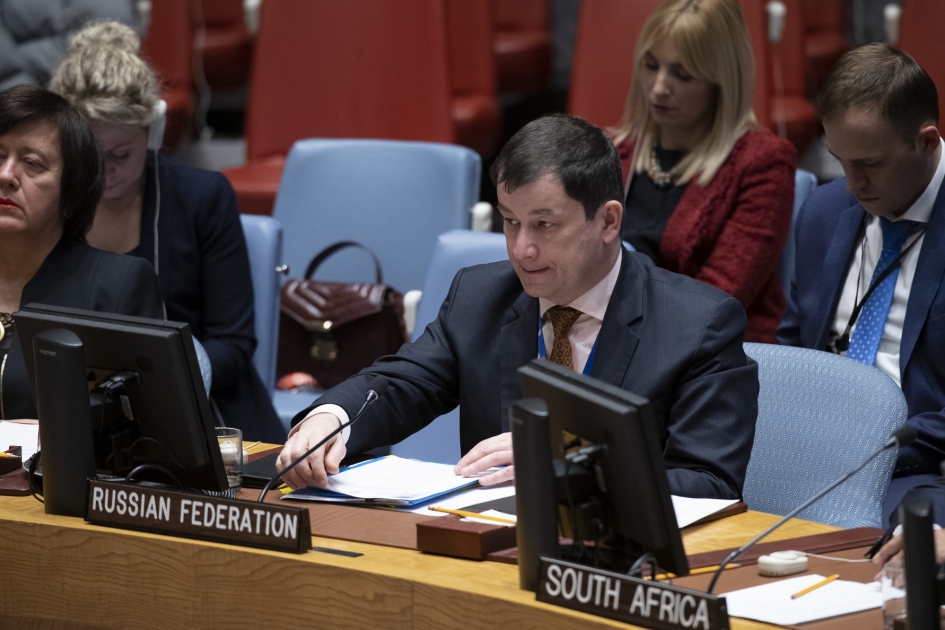Statement by First Deputy Permanent Representative Dmitry Polyanskiy at a UN Security Council Meeting on South Sudan
Mm. President,
We thank today’s briefers – Special Representative of the Secretary-General David Shearer and Permanent Representative of Poland Joanna Wronecka for the information they shared. May I extend our special thanks to you, Joanna, for your confident and professional leadership in the South Sudan Sanctions Committee during these two years.
South Sudan is living through a truly crucial period of history. It is our task to help this young state overcome all challenges that it encounters.
By all means, we (just like all our colleagues) are disappointed that transitional government was not assembled within the previously negotiated term – by 12 November. At the same time, we call not to overdramatize about the situation and not to put a cross on efforts that are made in this regard.
There is certain progress in implementation of the renewed peace agreement. It is important that sides prove ready to start dialogue and overcome contradictions through search for compromise solutions. In this regard, we highlight meetings of Salva Kiir and Riek Machar that have become regular. We consistently called for that. We believe this contact is necessary, as it can give the required impetus to the process of South Sudanese reconciliation.
In particular, we noted that several hours ago President Kiir said a principle agreement had been achieved about forming the Cabinet of Ministers. We expect to have more details and hope this agreement will be implemented as soon as possible.
Mm. President,
Let me point out several moments that instill certain optimism. Secretary-General’s report states that the level of armed violence and the number of inter-communal clashes have dropped. As the the situation with security is better now, humanitarian access has improved. The number of human rights violations also has decreased. All of this positively influences the return of South Sudanese refugees and IDPs to places of their permanent residence. We believe this has to do with implementation of confidence-building measures between the opposing sides on the ground. However, the most important achievement – and here we share the opinion of Secretary-General A.Guterres – is that sides abide by the ceasefire. We call on South Sudan to remain fully committed to these agreements.
We understand that the decision to extend the “pre-transition period” was a compulsory measure that hardly met expectations of the people of South Sudan. We have taken note of the position of IGAD that welcomed this step. We hope the sides in South Sudan will take every effort needed to resolve the remaining issues. As for non-signatories of the renewed peace agreement, we call upon them to join this shared state-building process promptly.
We believe it is vital that the regionals should “play the first fiddle” in terms of accompanying peace process in South Sudan. We welcome efforts of the African Union, IGAD, Sudan, RSA, and Uganda at this track. There should be unity in their approaches, which will help them act in accordance with principle “African solution to African problems”.
We proceed from the assumption that the sides will be able to enhance mutual trust and escape repeating the mistakes of the past only if they implement their obligations rigorously and to the fullest extent. We welcome the news about the decision of the authorities of South Sudan to allocate 40 million USD for implementation of projects within the framework of the renewed peace agreement, in particular, for creation of joint armed forces. This proves ones again that sides are willing to come to an agreement.
Mm.President,
In the context of advancing South Sudanese settlement, we call not to over-use sanctions pressure and, by far, unilateral restrictions. Positive moments that were highlighted today first became possible thanks to the contribution of regional mediators. More than that, at some point the existence of embargo impeded the implementation of regional security initiatives designed to promote the settlement. We believe after the South Sudanese have come to an agreement on all issues, we will need to revisit the sanctions regime in order to adapt it to the new reality on the ground.
Thank you.
